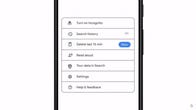
Devices running Android 12 will run AI-powered services on users' phones, not Google's servers.
Getty ImagesGoogle announced a handful of features Tuesday addressing user privacy and security for mobile devices and web browsers as the search giant took the wraps off the latest versions of its Android operating system and Chrome browser. The updates were unveiled at Google I/O, the company's annual developers conference.
The new services are designed to improve using passwords, storing photos privately and controlling what the Chrome browser remembers about you. In Android 12, the newest version of the operating system that powers almost nine out of 10 smartphones globally, a new feature will process your personal data in a secure manner while powering AI-driven services. Android will also give users options limiting the precision of location that apps can collect.
Most of the features limit the personal data outsiders can access about users, whether they be friends, third-party apps or hackers with stolen passwords. One new service limits what Google itself collects about your browsing history. Another aims to keep more of your personal data on your phone rather than on Google's servers.
"The big part of feeling safe online is having control over your data," said Jen Fitzpatrick, Google's senior vice president of core systems and experiences.
Here are the most important new features:
Android 12's Private Compute Core
Android 12 is rolling out with multiple new privacy features. The operating system will include Private Compute Core, which processes personal information on your phone. The idea is to allow services, such as Smart Reply, Live Caption and Now Playing, to access data about users without taking it off the phone or exposing it to compromise. All of those services require Google's AI to work.
"All the audio and language processing happens on-device, isolated from the network to preserve your privacy," Fitzpatrick said in a blog post.
Finally, Android 12 will let you choose whether to give apps your precise location or an "approximate location" that's based on your zip code. A precise location might make sense for something like a food delivery app but a weather app can work off of a more general location.
Chrome password manager upgrades
Google announced upgrades to its password manager, including a system to import passwords from other tools and systems. It also unveiled integration between the Chrome browser and Android apps, which extends the usefulness of the password manager beyond the browser by letting users log into app-based services on their phones or tablets.
The password manager will also begin alerting users if their password has been compromised. These warnings have become a common feature in password managers, typically pulling from databases of compromised login credentials that criminals have posted on forums. Google's password manager will also offer a "change password" button to make it easier for users to deal with the compromise immediately.
Google Photos now includes a locked folder
Google Photos will offer a locked folder where users can store photos they want to keep private. The locked folder silos photos so that they won't show up in other folders, shared folders or search results. The idea is to keep sensitive photos off your camera reel so you don't have to worry about showing them to someone you didn't mean to while scrolling through other pictures.
Fitzpatrick gave the examples of a photo of your passport or a surprise gift for someone in your life as sensitive. Another obvious application would be keeping separate and safe photos that include nudity or sexual intimacy.
Quick Delete provides retroactive Incognito Mode
A new Google Chrome feature called Quick Delete will let you put your last 15 minutes of web browsing history into Incognito Mode, erasing it from your browser. In Incognito Mode, Chrome won't store your browsing activity, cookies, web form entries or permissions you gave websites.
It's important to note that Incognito Mode doesn't stop websites from tracking your activity. It also doesn't give you privacy from a school or employer if you're browsing on a device they control. It also doesn't hide the data from your internet service provider.
"Android" - Google News
May 19, 2021 at 12:43AM
https://ift.tt/3weFijj
Google I/O: Android 12, Chrome features lock up photos, browsing history, location data - CNET
"Android" - Google News
https://ift.tt/336ZsND
https://ift.tt/2KSW0PQ
Bagikan Berita Ini















0 Response to "Google I/O: Android 12, Chrome features lock up photos, browsing history, location data - CNET"
Post a Comment